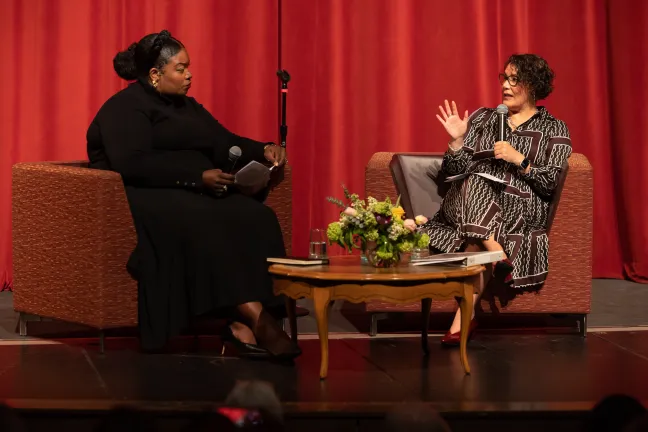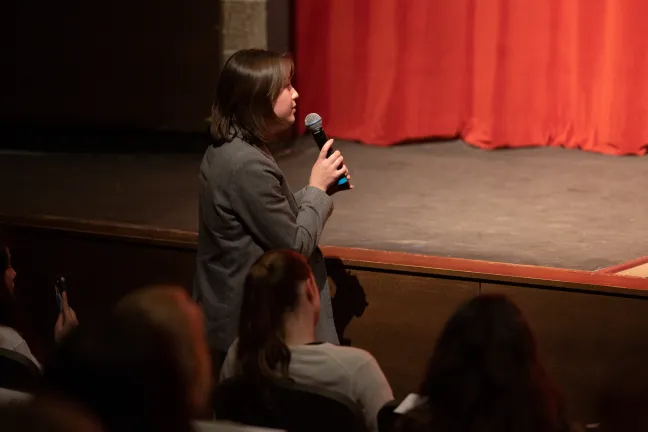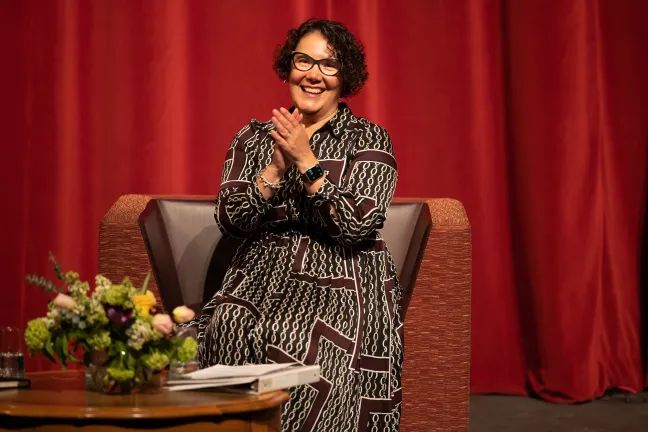After Multnomah County Chair Jessica Vega Pederson delivered her first State of the County address Tuesday, she participated in a question-and-answer session moderated by Chabre Vickers, Prosper Portland’s equity, policy and communications director. Vega Pederson responded to questions from both Vickers and students in the audience — a discussion that covered topics like community involvement, public health priorities, youth engagement in County decision-making, and the importance of equity and inclusion.
You can watch a video of the Chair Vega Pederson’s State of the County here.
Vega Pederson highlights importance of community involvement and leading with race
Vickers began by asking Vega Pederson what she’s learned both in her first 100 days as County chair and in her years of public service. “I’d love to understand more about the wisdom you’ve gleaned from community,” Vickers said.
Vega Pederson said that her 10-year public service career has taught her that effective leadership requires the input of community members. “The best policies, the best solutions come about when they are co-created with community, when they are co-created with people who are impacted most,” Vega Pederson said.
As an example, Vega Pederson brought up the Multnomah County Animal Services Division, saying that community members had for years raised concerns about the division, but problems persisted. When Vega Pederson became Chair, she initiated a detailed review of the divisionin response to longstanding structural and management challenges.
Community involvement will be key to that review process, Vega Pederson said. “It’s really important to me that a part of the review that we’re doing is taking in partner and stakeholder and community feedback,” Vega Pederson said.
Vickers then asked Vega Pederson about prioritizing constituents who have historically been left out of government decision-making, particularly community members who are Black, Indigenous, Latiné, and other people of color.
“It’s about inclusively leading with race,” Vega Pederson said, explaining that the County aims to center the experiences of historically marginalized groups to correct disparities. “We know that as we’re investing in communities that need help the most, we’re also lifting up the lives of all of our community members.”
Leading the County in the aftermath of the COVID emergency
Vickers then asked about the landscape of public health after years of focus on the COVID-19 pandemic. “When we think about COVID, there were so many other aspects of public health that weren’t being addressed,” Vickers said, asking if there are other public health initiatives that the County is prioritizing as it moves past the peak of the COVID emergency.
Vega Pederson underlined the importance of upstream solutions, pointing to County programs like the Healthy Birth Initiative as public health solutions. She also said reducing racial disparities was a public health issue — demonstrated by the Board of Commissioners declaring racism a public health crisis in 2021. “We know that there are very fundamental inequities in our society that have existed for decades that have generational impacts on people’s health, on people’s longevity, on people’s ability to thrive,” Vega Pederson said.
And, Vega Pederson said it will be important for the County to continue to address the region’s behavioral health crisis, which was exacerbated by the COVID-19 pandemic. “We can’t take our eye off that ball,” Vega Pederson said. “That’s why we’re making so many investments in behavioral health services across the board.”
Vickers followed up by asking how the County will prioritize funding for programs previously funded by the American Rescue Plan Act (ARPA), federal dollars that allowed the County to support the community through the COVID-19 pandemic. “The funds are going away. The issues aren’t, “Vickers said. “How will you and fellow commissioners rise up to support the community with issues that are still very much important to them?”
Vega Pederson said it was challenging coming into a budget cycle where $113 million in federal ARPA funding would be no longer available. “What the federal investments did is support services and investments that [the federal government] should have been making for years,” Vega Pederson said.
And, Vega Pederson added that COVID had disparate impacts on the community. “People who were well off before COVID are just as well off, sometimes better off, than they were before COVID. And people who were not [well off] are even further behind than they were,” Vega Pederson said.
She said the County will be focused on continuing COVID-era programs that reduced those disparate impacts, including community safety and gun violence prevention programs, homeless services, and mental health supports.
But, Vega Pederson said continued funding from federal and state governments will be important. “We have to have a broader community conversation about addressing some of the fundamental lacks in our community that need additional investments from the federal and state government,” Vega Pederson said.
Preschool for All's challenges and victories
Vickers asked Vega Pederson to talk about the first year of Preschool for All, the universal preschool program that was developed and passed by voters under Vega Pederson’s leadership. “What are the impacts that we should be excited about, and what are some of the challenges that lie ahead?” Vickers asked.
“I think we should be incredibly excited that we have 700 children in our community that have been able to experience a joyful, quality preschool environment this year that otherwise wouldn’t have had that opportunity,” Vega Pederson said.
Vega Pederson said a challenge with implementing universal preschool is workforce shortages caused by low wages — a trend that Preschool for All is working to reverse. “The fact that we have workers and providers of Preschool for All programs that are making a living wage — that are making salaries comparable to public school kindergarten teachers — is incredibly important to be able to grow the pipeline of people coming into the field, people who see this as a career opportunity,” she said.
She also pointed out that it can be easy to lose focus on upstream solutions, including ones like Preschool for All — but that it’s exciting to see solutions like Preschool for All come to fruition.
“In this work, it’s so easy to focus on the emergency in front of you, the crisis in front of you, because we know there are so many people in crisis right now. But we have to be making upstream investments,” Vega Pederson said. “We have to be making that generation-level change so that in 20 years we’re not in the same situation, or a worse situation, than we are now.”
“We have made investments that truly value people’s human potential, their capacity to rise, their capacity to thrive. That is what Preschool for All does. That is what a lot of the work the County does is about,” Vega Pederson said. “That is one thing we should be excited about.”
Students ask Chair about behavioral health, youth involvement and government coordination
Vega Pederson also responded to questions from students in the audience. Byronie McMahon, a senior at Cleveland High School who is this year’s student representative on the Portland Public Schools Board of Education, asked about the County’s investments in behavioral health for students.
Vega Pederson said the County expanded its investment in its School-Based Mental Health programming since the pandemic. “Those are investments we’re going to continue to make at the County,” Vega Pederson said. She also said the County is continuing to invest in SUN Community Schools, after-school programs that Vega Pederson said “create stability and engagement, especially in areas where students need that the most.”
Frankie Silverstein, a junior at Franklin High School who will serve as next year’s Student Representative for the Portland Public Schools Board of Education, asked how the County is involving students and youth in its budgeting process.
Vega Pederson admitted that one frustrating thing about entering office in the middle of a budget cycle was not being able to control the level of community engagement — including with youth — throughout the process, something she plans to correct with next year’s budget cycle.
She encouraged students to engage by attending and participating in the County’s budget hearings. And, she said students can apply to join Multnomah Youth Commission, the official youth policy body for both the City of Portland and Multnomah County with members aged 13-21.
Sophie McEwen, a Franklin high school student who serves on the school’s Mock Trial and Constitutional Law teams, asked the Chair to talk more about the County’s partnership with other jurisdictions. “I was wondering if you could speak to how the County will continue to work with the City and the State on issues that we have beliefs on?”
Vega Pederson said that collaboration with other government agencies has been a priority since she took office. “People want government to be working together to find solutions to our problems,” Vega Pederson said, adding that all levels of governments need to work together — and with community members and stakeholders — to be effective.
She said increased communication and transparency has been key to improving coordination with other local governments. “We’ve made some really great inroads, at the level of the City and with the State. I’m really happy with where we are now with those relationships.”
To close out, Vega Pederson shared her optimism about the future of Multnomah County.
“I am so optimistic about where we are right now in our County and our City, the potential that we have — coming out of COVID and a racial reckoning that is long overdue — to take the experience we all had and work together change things that have needed to be changed for a long time. To make the investments together to address with honesty, frankness, transparency the challenges we have, and working toward that together,” Vega Pederson said.



